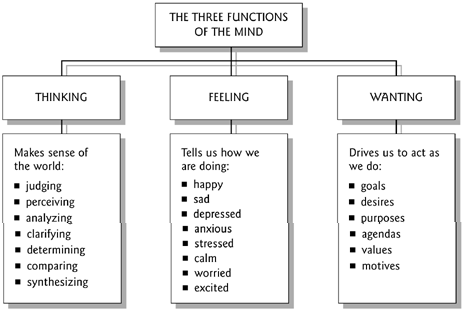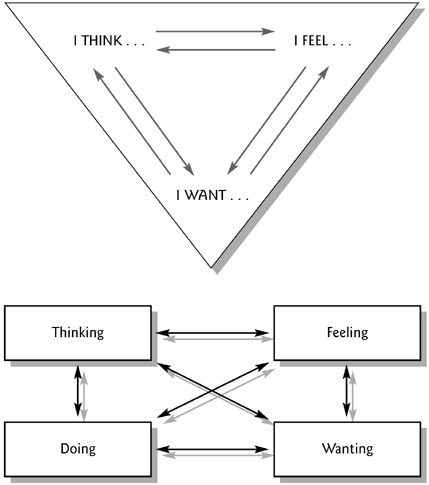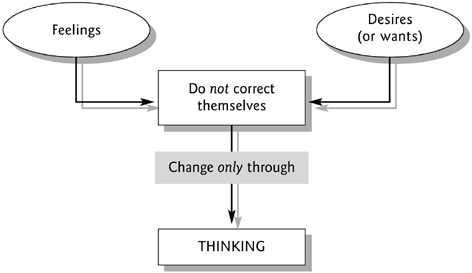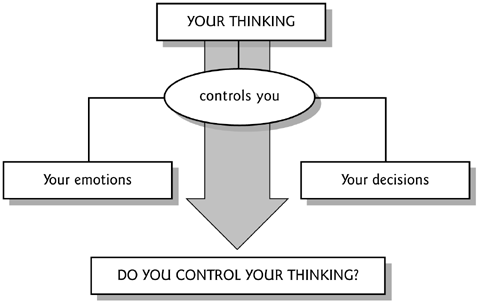Westside Toastmasters is located in Los Angeles and Santa Monica, California
Chapter 4. Self-Understanding
The preceding chapters emphasized that:
Critical thinking requires the development of basic intellectual skills, abilities, and insights;
Becoming a skilled thinker is like becoming skilled in basketball, ballet, or saxophone playing;
These skills can be used to serve two incompatible ends: self-centeredness or fair-mindedness;
The skills of critical thinking can be learned in a "weak" sense (selfish thinking);
We are focused on the development of critical thinking in a "strong" sense (i.e., serving fair-minded thinking);
Fair-mindedness requires that we develop a network of interrelated traits of mind;
Developing as a thinker is challenging, requiring internal motivation.
Our goal in this chapter is to lay a foundation for understanding better how the human mind works. We will begin by taking a further look at human egocentrism and the obstacle it represents. We then will take a look at some of the most basic distinctions we can use to achieve greater self-command.
Our latent egocentrism asserts itself through each of the basic functions of the mind. We must understand those functions, as they work in relationship to each other.
Only through our practical insight into how our mind operates can we hope to understand, and transform, ourselves.
Monitoring the Egocentrism in Your Thought and Life
One of the fundamental challenges most humans face in developing is that our life is dominated by a tendency to think and feel egocentrically. Our life is deeply situated in our own immediate desires, pains, thoughts, and feelings. We seek immediate gratification or long-term gratification based on an essentially selfish perspective. We are not typically or fundamentally concerned with whether our perceptions or meanings are accurate, though we may think we are. We are not significantly concerned with personal growth, self-insight, or ultimate integrity, though we think we are. We are not deeply motivated to discover our own weaknesses, prejudices, or self-deception. Rather, we seek to get what we want, avoid the disapproval of others, and justify ourselves in our own mind.
The tendency for humans to think in an egocentric fashion means that, typically, we have little or no real insight into the nature of our own thinking and emotions. For example, many of us unconsciously believe that it is possible to acquire knowledge without much thought, that it is possible to read without exerting intellectual energy, and that good writing is a talent one is born with - not a product of practice and hard work. As a result, we tend to evade responsibility for our own development. We do not seek to learn new ways of looking at things. Much of our thinking is stereotypical and simplistic, yet our egocentrism prevents us from recognizing this. We create the inner chains that enslave us.
These inner chains can have a negative effect on our relationships, success, growth, and happiness. It is not possible to get beyond the egocentrism that you and I inherit as human beings by ignoring our ego or pretending that we are decent people. We can restrain our egocentrism only by developing explicit habits that enable us to do so. We get beyond egocentric emotional responses not by denying that we ever respond in such a way but, rather, by owning these responses when they occur and restructuring the thinking that is feeding those emotions.
For example, each of us wants to see ourselves as an ethical person. Yet, through our egocentrism we often behave in ways that are blatantly unethical. Industries, for example, often engage in systematic practices that result in large amounts of pollutants in the environment. Yet if asked to explain their behavior, they will instead justify it through rationalization. They will make comments such as "We meet and exceed all of the federal regulations for pollution control, and in fact we do more than most companies to ensure that we don't pollute." Yet these companies are often hiding behind the concept of "federal regulations." They are not essentially concerned with the ethical or unethical nature of their behavior. Rather they are concerned simply with following the regulations. In cases such as these, industry leaders are unconcerned with whether they are actually polluting. They may not even know whether they are causing damage to the environment. And very often they do not want to know. Through their egocentrism they are able to avoid self-scrutiny. They are able to go on engaging in practices that will yield the highest monetary gain, without reference to the impact of the behavior on the environment.
We will return to the problem of dealing with egocentrism later. But you should begin to think about what egocentrism is and to monitor your thinking for evidence of it.
Test the Idea
|
Making a Commitment to Fair-Mindedness
Though no one defines himself or herself as an egocentric person, each of us should recognize that being egocentric is an important part of what we have to understand in dealing with the structure of our mind. One of the ways to begin to confront our own egocentrism is by exploring the extent to which we have allowed our identity to be egocentrically shaped. For example, as we previously emphasized, we are all born into a culture, a nation, and a family. Our parents inculcate into us particular beliefs (about the family, personal relationships, marriage, childhood, obedience, religion, politics, schooling, and so on). We form associations with people who have certain beliefs (which they have encouraged, or expected, us to accept). We are, in the first instance, a product of these influences. Only through self-understanding can we begin to be more than a product of influences.
If we uncritically believe what we were taught to believe, these beliefs are likely to become part of our egocentric identity. When they do, it affects the manner in which we believe. For example, we are all egocentric to the extent that an examination of our attitudes reveals that we unconsciously use egocentric standards to justify our beliefs:
- "It's true because I believe it." People don't say this aloud, but we often find ourselves assuming that others are correct when they agree with us and incorrect when they do not. The way we respond to people indicates that we egocentrically assume we have a unique insight into the truth.
- "It's true because we believe it." Our behavior indicates that we egocentrically assume that the groups to which we belong have a unique insight into the truth. Our religion, our company, our country, our friends are special - and better.
- "It's true because I want to believe it." Our behavior indicates that we more readily believe what coincides with what we egocentrically want to believe, even to the point of absurdity.
- "It's true because I have always believed it." Our behavior indicates that we more readily believe what coincides with beliefs we have long held. We egocentrically assume the rightness of our early beliefs.
- "It's true because it is in my selfish interest to believe it." Our behavior indicates that we more readily believe what coincides with beliefs that, when held, serve to advance our wealth, power, or position, even if they conflict with the ethical principles that we insist we hold.
If we consciously recognize these tendencies in ourselves and deliberately and systematically seek to overcome them by thinking fair-mindedly, our definition of ourselves can aid our development as thinkers. We then begin to divide our thoughts into two categories: 1) thoughts that serve to advance the agenda of our egocentric nature, and 2) thoughts that serve to develop our rational fair-mindedness. To effectively do this, we need to develop a special relationship to our mind; we must become a student of our mind's operations, especially of its pathology.
Recognizing the Mind's Three Distinctive Functions
The mind has three basic functions - thinking, feeling, and wanting Figure 4.1 & 4.2..
- The function of thinking is to create meaning. Thinking makes sense of the events of our lives; it sorts events into named categories and finds patterns for us. It continually tells us: This is what is going on. This is what is happening. Notice this and that. This is how it makes sense to understand the situation. It is the part of the mind that figures things out.
- The function of feeling is to monitor or evaluate the meanings created by the thinking function - evaluating how positive and negative the events of our life are, given the meaning we are ascribing to them. It continually tells us: This is how you should feel about what is happening in your life. You're doing really well. Or, alternatively, watch out - you are getting into trouble!
- The function of wanting allocates energy to action, in keeping with our definitions of what is desirable and possible. It continually tells us: This is what is worth getting. Go for it! Or, conversely, it tells: This is not worth getting. Don't bother.
Figure 4.1. The three basic functions of the mind are intricately interrelated.

Figure 4.2. Thinking is the part of the mind that figures out what is going on. Feelings tell us whether things are going well or poorly for us. The wanting part of the mind propels us forward or away from action.

Looked at this way, our mind is continually communicating three kinds of things to us: 1) what is going on in our life; 2) feelings (positive or negative) about those events; and 3) things to pursue, where to put our energy (in the light of 1 and 2).
What is more, there is an intimate, dynamic interrelation between thinking, feeling, and wanting (Figure 4.3). Each is continually influencing the other two. When, for example, we think we are being threatened, we feel fear, and we inevitably want to flee from or attack whatever we think is threatening us. When we think that attending a meeting will be a waste of time, we will want to avoid attending it and will feel bored if compelled to attend.
Figure 4.3. Thinking, feeling, and wanting are interwoven. Where there is one, the other two are present as well. These three functions continually interact and influence one another in a dynamic process.

Understanding That You Have a Special Relationship to Your Mind
It should now be clear that everyone lives in a special and intimate relationship to his or her mind - at least unconsciously. The trick is to make that unconscious relationship conscious and deliberate. All of our activity is a product of inward ideas of who and what we are, ideas of what we are experiencing (from moment to moment), of where we are going (our future), of where we have come from (our past). And, in addition, all of these ideas are in a state of continual interplay with our emotions and feelings about them. Emotions and feelings function as ongoing evaluators of the quality of our lives and circumstances.
For every positive thought the mind "believes," the mind naturally tends to generate a positive emotion to fit it. Conversely, for every negative thought, the mind tends to generate a negative emotion. If we explicitly recognize the continual interrelationships among these three functions of our mind, we will gain a central insight that we can begin to use to our advantage. Then we can begin to exercise command over our own mind's functions. Let's look into this idea more closely.
We experience joy, happiness, frustration, pain, confusion, desire, passion, and indifference because we give a meaning to every situation we experience, because we think about it in a particular fashion, and because we connect it to feelings we experienced in what we perceived as similar or related circumstances. The meaning we create can be grounded in insight, objective reality, a fantasy, or even a dysfunctional interpretation of reality. For example, two people in the same situation may react completely differently, with one person experiencing pain and frustration while the other experiences curiosity and excitement.
Consider two employees faced with the task of improving office procedures in order to improve productivity. The first experiences resentment at being required to change what appears to be "working just fine." This person gives a negative meaning to the task of improvement, considering it unnecessary and time consuming (when so many other things are more important). Given the negative thinking this person is engaging in, s/he will feel negative emotions about the task.
In the same situation, another person might welcome the opportunity for improvement. Defining the situation as a chance to be creative and to think independently about ways to improve procedures, she/he looks forward to the task. Positive, rather than negative, emotions result from such a definition.
The actual task at hand is precisely the same. Nevertheless, the difficulty or ease with which a person handles the challenge, the decision to take up the challenge or avoid it altogether, ultimate success or failure, is determined fundamentally by the manner in which the situation is interpreted through one's thinking (Figure 4.4). Different emotions follow from these differences in thought and action.
Figure 4.4. We change undesirable feelings and desires by changing the thinking that is leading to them.

When we understand the interrelated roles of thoughts, feelings, and motivation, when we can see that for every feeling state we experience, a related thought process exists that motivates us to some action, we can begin to analyze thoughts underlying our emotions and desires. If I am frustrated in a meeting, I can ask myself: What is the thinking in my mind that is leading to this feeling of frustration? What exactly am I frustrated with? What is the thinking that leads me to be frustrated Figure 4.5 & 4.6?
Figure 4.5. By taking command of our thinking we can take command of all three functions of the mind.

Figure 4.6. Your thinking controls every part of your life. But do you control your thinking?

Test the Idea
|



